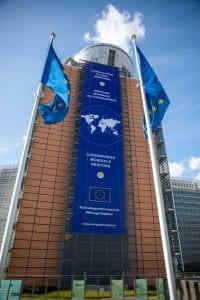By Prof Keith Syrett, Professor of Health Law and Policy (University of Bristol Law School)

The European Union has been widely criticised for its response to the outbreak of pandemic coronavirus (COVID-19) in early 2020. Still distracted by Brexit and, more recently by the Turkish migrant crisis, EU leaders were caught off guard by the rapid spread of the virus, initially into Italy. Member states took actions into their own hands, imposing border controls, banning exports of protective equipment and, later, banning mass gatherings, closing schools, and instituting lockdowns, while the EU appeared to be a largely impotent bystander.
Perhaps the EU’s muted initial response was unsurprising, given that previous public health threats of a similar type, such as SARS, MERS and Ebola, had had little impact within the Union. However, more than a decade previously, concerns had been raised about lack of preparedness for a pandemic outbreak in Europe.[1] Notwithstanding the EU’s subsequent establishment of a firm legal basis for a response to pandemics, it now seems that the lessons presented previously had not fully been learned. (more…)
